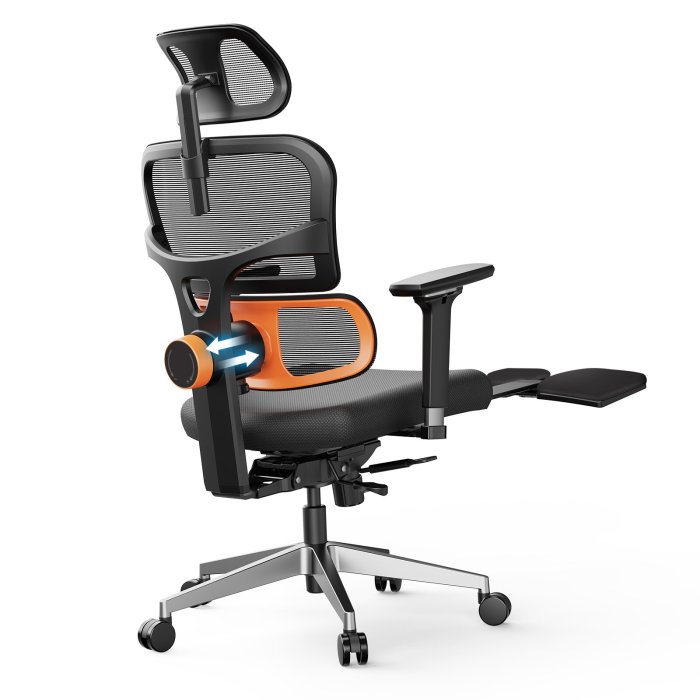
As ergonomic office chairs take center stage, they play a pivotal role in shaping healthier work environments. These chairs are not just about comfort; they are essential tools for promoting employee health and productivity, especially for those spending long hours at a desk.
Investing in ergonomic office chairs can significantly reduce common health issues like back pain and poor posture, making them a worthwhile consideration for both individuals and organizations aiming for a more supportive workspace.
Importance of Ergonomic Office Chairs
In the modern workplace, where employees often spend long hours seated at desks, the choice of office chair can have a significant impact on health and productivity. Ergonomic office chairs are designed to support natural body posture, reducing the risk of strain and injury. By investing in these chairs, companies not only enhance employee comfort but also boost overall efficiency.Long-term benefits of using ergonomic chairs are evident, especially for individuals who work extended hours.
Enhanced lumbar support, adjustable features, and high-quality materials contribute to better posture and reduced fatigue. Employees who utilize ergonomic chairs are less likely to experience chronic pain, leading to fewer sick days and higher job satisfaction. In contrast, poor seating choices can lead to common health issues such as back pain, neck strain, and repetitive strain injuries, which can severely hinder workplace productivity.
Features of Ergonomic Office Chairs
Key features that define an ergonomic office chair are essential for ensuring comfort and support. The following characteristics are crucial:
- Lumbar Support: Provides necessary back support to maintain the natural curve of the spine.
- Adjustability: Chairs should offer adjustable height, armrests, and seat depth to accommodate various body types.
- Material: Breathable fabrics and cushioning materials help maintain comfort during long periods of use.
When comparing different types of ergonomic chairs available on the market, one can find options ranging from traditional task chairs to more advanced models featuring additional technologies such as temperature regulation and automated adjustments. To evaluate the ergonomics of an office chair, consider the following checklist:
- Adjustable seat height
- Supportive lumbar area
- Multiple positional adjustments
- Wheelbase stability
- Material quality and breathability
Customer Service in Ergonomic Furniture Sales
Customer service is a vital component of the ergonomic office chair industry. Providing exceptional support not only builds brand loyalty but also ensures that customers have a satisfactory purchasing experience. Best practices for customer support in this sector include knowledgeable staff who can answer questions about chair features and benefits. Engaging customers with personalized recommendations based on their specific needs can significantly enhance their shopping experience.
Handling customer complaints and returns effectively is equally important. A clear return policy, prompt response times, and a willingness to assist can turn a negative experience into a positive one, fostering trust and satisfaction.
Entrepreneurial Opportunities in the Ergonomic Office Chair Market
The ergonomic office chair market presents various entrepreneurial opportunities for those interested in starting a business. Potential business models include e-commerce platforms, specialty retail stores, and subscription services for ergonomic products.Target markets for ergonomic chair entrepreneurs often include remote workers, corporate offices, and educational institutions. Identifying specific demographics, such as tech companies or design firms, can also lead to focused marketing strategies.Innovative marketing strategies for promoting ergonomic chairs might involve educational campaigns highlighting the health benefits of ergonomic seating, partnerships with health professionals, and utilizing social media to showcase customer testimonials and real-life applications of ergonomic chairs.
Business Ethics in Ergonomic Manufacturing
The production of ergonomic office chairs involves several ethical considerations. Manufacturers must prioritize the well-being of both consumers and workers. Ensuring the use of high-quality materials and sustainable practices is essential in maintaining ethical standards.Environmentally sustainable practices in chair manufacturing include using recycled materials and minimizing waste during production. Brands that adopt eco-friendly methods not only contribute to environmental conservation but also appeal to a growing segment of environmentally conscious consumers.Labor practices are another crucial aspect, with fair trade issues playing a significant role in how ergonomic furniture is perceived.
Ensuring fair wages and safe working conditions for employees in manufacturing facilities is critical for ethical compliance.
Business Franchising in the Ergonomic Sector
Franchising within the ergonomic office chair market allows entrepreneurs to leverage established brand recognition and business models. This approach can significantly reduce the risks associated with starting a new business.The benefits of franchising include access to a proven operating system, marketing support, and ongoing training. However, challenges such as adhering to strict franchise guidelines and possible financial constraints must be considered.Successful ergonomic chair franchises often differentiate themselves through unique product offerings, customer service excellence, and innovative marketing strategies that resonate with their target audience.
Furnishings and Supplies for Ergonomic Workspaces
Selecting the right furnishings and supplies alongside ergonomic chairs is crucial for creating an effective workspace. A well-designed office promotes comfort and productivity, ensuring that employees can work efficiently.To design an ergonomic workspace, consider the layout, desk height, and additional accessories that enhance the ergonomic experience. Proper placement of monitors, keyboards, and other tools is vital to maintain a healthy work posture.Essential ergonomic accessories that complement office chairs include:
- Adjustable standing desks
- Footrests
- Keyboard trays
- Monitor stands
- Anti-fatigue mats
Human Resources and Employee Wellness Programs
The role of HR in implementing wellness programs that incorporate ergonomic chair usage is increasingly significant. Providing education on the benefits of ergonomic seating can lead to a healthier workforce.Methods for educating employees include workshops, informational sessions, and easy access to resources that Artikel the advantages of using ergonomic chairs. Regular assessments of employee satisfaction regarding ergonomic furniture can help HR adjust policies and offerings to better meet employee needs.Gathering feedback through surveys can provide insights into how ergonomic chairs are impacting overall workplace wellness and productivity.
Industrial Mechanical Aspects of Ergonomic Chairs
The mechanical design principles involved in creating ergonomic office chairs focus on ensuring comfort, support, and versatility. Understanding body mechanics is essential for designers to develop chairs that cater to diverse user needs.Technology plays a significant role in enhancing the functionality of ergonomic seating. Features such as smart adjustments based on user preferences, built-in sensors for posture correction, and automated movements are becoming increasingly popular.Trends in mechanical innovations within the ergonomic furniture industry include lightweight materials, modular designs, and integrated technology that allows for customization and improved user interaction.
Summary

In summary, ergonomic office chairs are crucial for fostering well-being and efficiency in the workplace. By understanding their features and benefits, businesses can not only enhance employee satisfaction but also create a thriving work culture that prioritizes health and productivity.
Clarifying Questions
What makes an office chair ergonomic?
An ergonomic office chair is designed to support the natural curve of the spine, offering features like lumbar support, adjustable height, and seat depth to promote comfort and proper posture.
How often should I adjust my ergonomic chair?
It’s recommended to adjust your chair settings whenever you change tasks or positions, ensuring optimal support throughout your workday.
Can ergonomic chairs really improve productivity?
Yes, ergonomic chairs can enhance productivity by reducing discomfort and fatigue, allowing employees to focus better on their tasks.
Are all ergonomic chairs expensive?
While some ergonomic chairs can be pricey, there are many affordable options that still provide essential ergonomic features without breaking the bank.
How do I clean my ergonomic chair?
Cleaning an ergonomic chair typically involves using mild soap and water for fabric surfaces and specific cleaners for leather, ensuring you follow the manufacturer’s care instructions.





